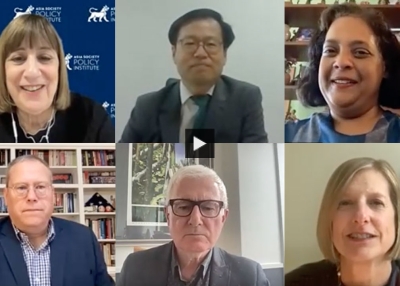The Evolution of the Global Trading System: How the Rise of Asia and Next Generation Trade Will Shape the Future Economy
ASPI Report

Over the last seventy years, global trade flows have grown to an unprecedented level, facilitated by the lowering of tariffs and the creation of a shared set of rules. The Asia Pacific region has been central to this remarkable growth, with trade volumes nearly quadrupling in the last twenty years. Asian countries view trade as a critical tool to grow their economies, strengthen supply chain resiliency, create jobs, foster development, attract foreign direct investment, and promote innovation. As a result, they have been on the forefront of concluding trade agreements, and in the process tackling emerging issues through innovative approaches.
In the meantime, many of the existing institutions, groupings, and approaches that have supported a strong rules-based trading system have not sufficiently stepped up to address emerging challenges.
In particular, negotiating efforts at the World Trade Organization (WTO) have largely stalled with WTO members to date unable to forge consensus on pressing trade matters affecting climate, health, and digital, to name just a few. Additionally, as the scope of trade agreements has expanded over time, concluding comprehensive agreements has become more difficult. Finally, increased geopolitical tensions have impacted the multilateral trading system’s ability to function and thus respond effectively to new challenges.
A new Asia Society Policy Institute (ASPI) report, The Evolution of the Global Trading System: How the Rise of Asia and Next Generation Challenges Will Shape the Future Economy, by ASPI's Shay Wester, explores next-generation trade challenges where new rules and new approaches will be needed. It concludes with observations on how these changes are reshaping the global trading system and examines how governments will need to adapt going forward.
This report was made possible through the generous support of Citi.

ABOUT THE AUTHOR
Shay Wester is the Director of Asian Economic Affairs and Outreach Director at the Asia Society Policy Institute (ASPI), where his research focuses on trade and economics in Asia. Prior to joining ASPI, Shay spent 9 years in Singapore at the US-ASEAN Business Council, where he led policy strategy and programming across all industry verticals. Earlier in his career, Shay served on the legislative staff of a senior member of the U.S. Senate. Originally from Texas, Shay received his undergraduate degree in Economics and Political Science from Southern Methodist University. He holds a Master’s Degree in International Relations and International Economics from the Johns Hopkins University School of Advanced International Studies (SAIS) in Washington D.C.
ABOUT THE PROJECT ADVISOR
Wendy Cutler is Vice President at the Asia Society Policy Institute (ASPI) and the Managing Director of the Washington, D.C. office. In these roles, she focuses on building ASPI’s presence in the nation's capital and on leading initiatives that address challenges related to trade, investment, and innovation, as well as women’s empowerment in Asia. She joined ASPI following an illustrious career of nearly three decades as a diplomat and negotiator in the Office of the U.S. Trade Representative (USTR), where she also served as Acting Deputy U.S. Trade Representative. During her USTR career, she worked on a range of bilateral, regional, and multilateral trade negotiations and initiatives, including the U.S.-Korea Free Trade Agreement, the Trans-Pacific Partnership, U.S.-China negotiations, and the WTO Financial Services negotiations. She has published a series of ASPI papers on the Asian trade landscape and serves as a regular media commentator on trade and investment developments in Asia and the world.

